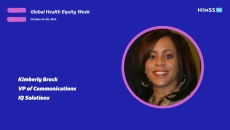Government & Policy
Technology, clinicians and pharmacies all have key roles to play in dealing with the social determinants of health, say Iris Frye and Nicholas Christiano Jr., co-chairs of Health Equity Policy Task Force under the HIMSS Public Policy Committee.
It is delivering on reform promises made following the recommendations of the Aged Care Quality and Safety Commission.
During Global Health Equity Week, HIMSS is calling on its members to contact senators and state governors to make policy changes preserving virtual care flexibilities and modernizing information and technology systems to improve perinatal healthcare.
IQ Solutions works with nonprofit organizations and federal agencies to help expand access to care and improved population health. Kimberly Brock, the company's VP of communications, explains more.
Since Roe v. Wade was overturned, HHS has received complaints about refusals by chain pharmacies, Becerra says.
Christina Nichols, vice president of U.S. government solutions for Philips, describes her company's innovative responses to the pandemic – and how those tools are being reimagined to help boost access worldwide.
Among other impacts, ending the PHE would represent access challenges and a loss of Medicaid coverage for millions, and would end medication-assisted treatment for opioid use disorder without an in-person exam
MHS Genesis, the military's Oracle Cerner EHR, is now available to 10,000 more clinicians and providers across 18 military treatment facility commands, with new revenue cycle management tools.
The Biden Administration blueprint outlines principles for the use of artificial intelligence and is meant to help government agencies level set – but it's also an operational vision addressing automation in data-sensitive domains such as healthcare.
The exchange of justice-involved patient health information aims to improve care during and after incarceration and address social determinants of health limiting care access.









